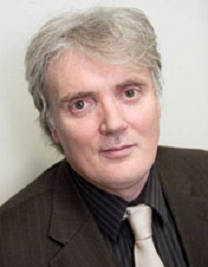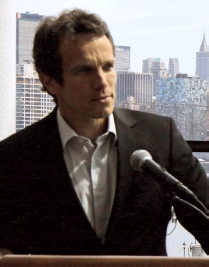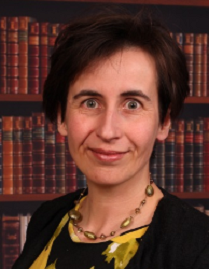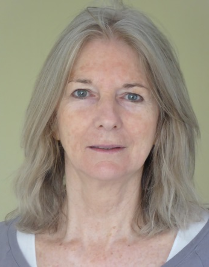Our Advisory Group
 |
Mick Blowfield
Director of IIED's (International Institute for Environment and Development) Sustainable Markets Group Mick Blowfield is director of IIED's Sustainable Markets Group, the home for IIED's work on the green economy, environmental economics, sustainable finance, and the private sector's role in sustainable development. Mick is a researcher and global thought leader on business and sustainability. He works with major companies, NGOs and government agencies on what business will look like in the 21st century, and how it will make the transition from where we are now to the future. His work is widely published, and he has worked for many years on convening dialogues with the private sector and sustainable development, climate change, and other major challenges. He is currently exploring what business will look like under different climate change scenarios - the theme of his fourth book to be published by Oxford University Press. He is also working with one of the largest companies in the world on business models that will enhance the business-society relationship. Mick is a fellow at Oxford and emeritus professor at Wolverhampton University. Among his many corporate clients are Accenture, Abbott Laboratories, Mars, Shell and Unilever. |
 |
Vincent Doumeizel
Vice President Food & Beverage, Lloyd’s Register (LRQA) With 15 years’ experience in Food Safety Certification, Vincent Doumeizel joined LR Management Systems (LRQA) in 2015 as Vice President Food & Beverage. Vincent has a degree in economics and gradually focused on agro-food with various experiences all around the word. With LRQA Vincent is focused on further strengthening the strategic direction and reach of LRQA’s global food business, through the delivery of existing services and a wider portfolio designed to meet the needs of the thousands of food sector organisations that we serve worldwide. Vincent also supports the charitable objectives of the LR Foundation by identifying and supporting innovative food projects through funding, with an objective to increasing Food Supply Chain resilience all around the world. |
 |
Craig Johnson
Education Programme Manager, Ellen MacArthur Foundation Craig is a core member of the Education team with specific responsibility for the higher education curriculum development initiatives and the commissioning and development of publications for the HE programme. He is currently working with academic teams at our Pioneer Universities on a range of circular-economy oriented courses. Prior to joining the Ellen MacArthur Foundation, Craig worked for WWF UK as head of secondary education and then the Yorkshire and Humber Regional Development Agency as manager of their education for sustainable development programme. Craig is co-author (with Ken Webster) of Sense and Sustainability - educating for a low carbon world and co-editor (with Jocelyn Blériot and Ken Webster) of A New Dynamic - effective business in a circular economy (Ellen MacArthur Foundation, 2013). |
 |
Simon Pickard
Director for International Programmes, ABIS (The Academy of Business in Society) As the Director for International Programmes, Simon Pickard is responsible for overseeing ABIS' current and future projects, as well as coordinating funding, strategic alliances and events. This incorporates direct oversight of ABIS' multi-million euro programmes on research, education and training, and by extension the building of ABIS' strategic international partnerships. Simon joined ABIS as Deputy Director in March 2006, following the completion of his MBA at HEC School of Management in Paris. Prior to attending business school, he worked for Oxbridge Academic Programs, a not-for-profit organization based in New York, USA, in management then an executive capacity. Under its auspices, he was responsible for the creation and implementation of intensive summer schools and professional development seminars, all based at the Universities of Oxford and Cambridge or in Paris |
 |
Dr. Gill Seyfang
Reader, School of Environmental Sciences, University of East Anglia Gill Seyfang is a Reader in Sustainable Consumption, and leads a programme of research on 'grassroots innovations' for sustainability. Gill is an interdisciplinary environmental social scientist, linking sustainability policy agendas with ‘new economics’ theories and cutting-edge community-based practice. In addition, Gill is a UEA Teaching Fellow, developing inspiring and creative, innovative teaching using performing arts pedagogies and 'comedy in the classroom'. Gill leads the Sustainable Consumption strand of the 3S (Science, Society and Sustainability) Research group in the School and her main research interest is around grassroots innovations, which are community-led initiatives which challenge mainstream consumer culture. Recent research projects in this field have been on complementary currencies (GICC) and community energy (CISE) (http://www.grassrootsinnovation.org). Gill is the author of 'The New Economics of Sustainable Consumption: Seeds of Change' (Palgrave Macmillan, 2009) and a prize-winning paper on the Transition Towns movement in the UK, and is co-editor of the International Journal of Community Currency Research (http://www.ijccr.net). In addition, Gill is a member of the UEA's Green Academy change team, a Higher Education Academy initiative to embed sustainability into all aspects of higher education. |
 |
Dr. Julie Smith
Visiting Fellow at the CCRI (Countryside and Community Research Institute) University of Gloucestershire Julie Smith is a Visiting Fellow at the CCRI (Countryside and Community Research Institute) University of Gloucestershire where she previously completed her PhD (Geography) on traditional food systems. She worked as a Research Fellow in the Centre for Food Policy, City University London from 2011 -2016 and was a Visiting Scholar at the Ruralia Institute, University of Helsinki in 2012. Julie’s research is on the sustainable production and consumption of food, with a policy focus. In recent EU project work, she has engaged in dialogue and co-learning with stakeholders to produce shared knowledge outcomes, and worked on scenarios of possible ‘food futures’. Recent papers propose policy frameworks for more sustainable local-global food chains; discuss the competing policy demands for more sustainable public sector food procurement; and develop a social impact assessment methodology for SMEs in selected food and drink products. Her current research develops her ideas on traditional food provisioning systems and ‘modern’ food culture. |
©Steppingup 2024


